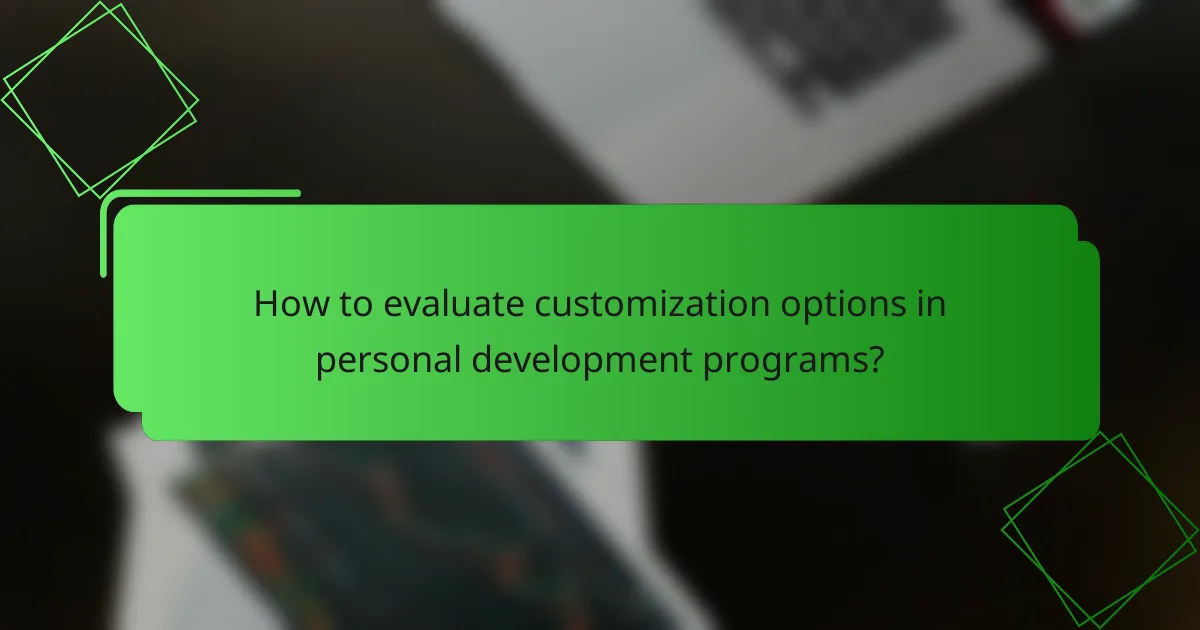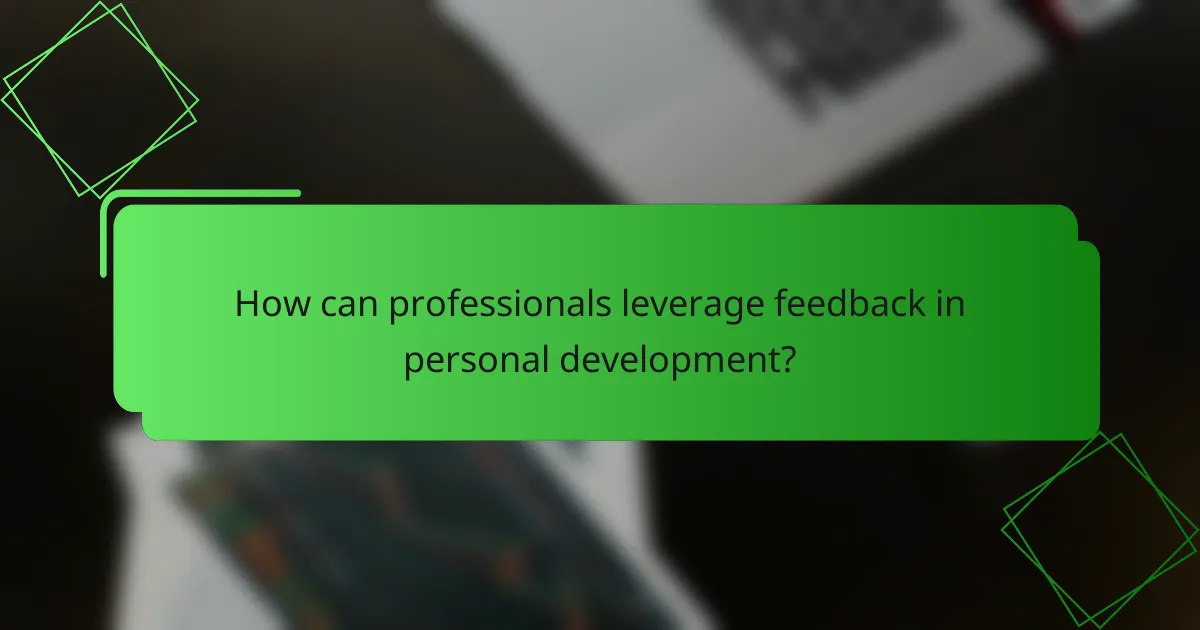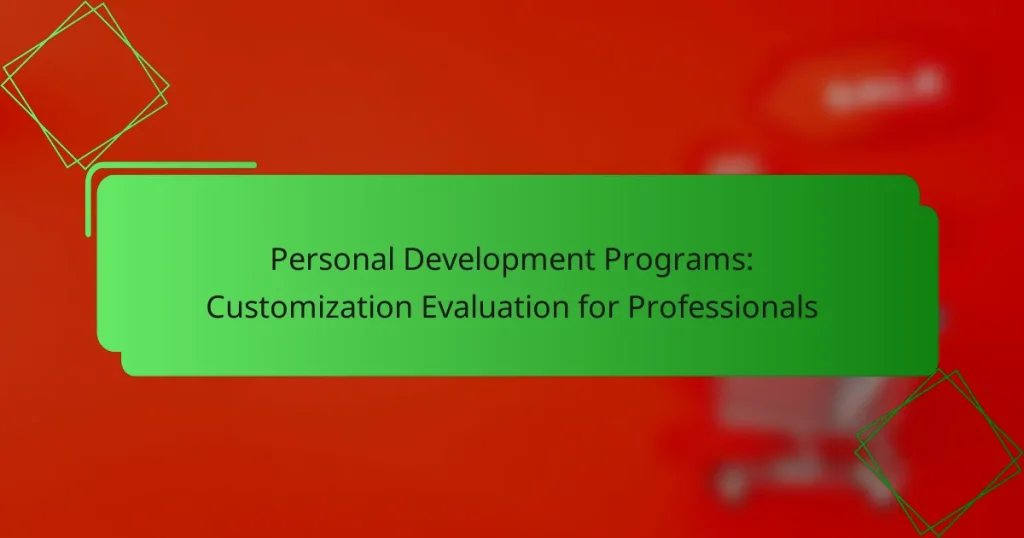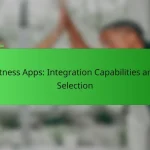Personal development programs for professionals are designed to enhance skills, improve well-being, and cultivate leadership qualities. Evaluating customization options is crucial, as it ensures the program aligns with individual learning needs and professional aspirations. Key factors such as instructor expertise, peer interaction, and program structure significantly influence the effectiveness of these programs.

What are the best personal development programs for professionals?
The best personal development programs for professionals focus on enhancing skills, improving well-being, and fostering leadership qualities. These programs can vary widely in format and content, catering to individual needs and organizational goals.
Mindfulness-Based Stress Reduction
Mindfulness-Based Stress Reduction (MBSR) is a structured program designed to help professionals manage stress through mindfulness meditation and awareness techniques. Participants typically engage in practices that promote relaxation and mental clarity, which can lead to improved focus and productivity.
Consider joining an MBSR program that includes both in-person and online options, allowing for flexibility. Many programs last around eight weeks and involve weekly sessions and daily home practice, making it easier to integrate into a busy schedule.
Leadership Development Programs
Leadership Development Programs (LDPs) are tailored to enhance leadership skills and prepare professionals for higher responsibilities. These programs often include workshops, mentoring, and experiential learning to cultivate essential competencies like decision-making, communication, and team management.
When selecting an LDP, look for programs that offer real-world applications and feedback mechanisms. Many organizations provide internal LDPs, but external options from reputable institutions can also provide valuable perspectives and networking opportunities.
Online Coaching Platforms
Online coaching platforms connect professionals with experienced coaches who provide personalized guidance and support. These platforms often feature a range of coaching styles, allowing individuals to choose what best fits their needs, whether it’s career advancement, skill enhancement, or personal growth.
When using an online coaching platform, consider factors such as the coach’s qualifications, user reviews, and session flexibility. Many platforms offer subscription models, so evaluate the cost-effectiveness based on your goals and frequency of sessions.
Skill Development Workshops
Skill development workshops focus on specific competencies, such as communication, negotiation, or technical skills. These workshops are often hands-on and interactive, providing immediate application of learned concepts in a collaborative environment.
To maximize the benefits of skill development workshops, choose those that align with your career goals and offer practical exercises. Look for workshops that provide follow-up resources or ongoing support to reinforce learning and application in the workplace.

How to evaluate customization options in personal development programs?
To evaluate customization options in personal development programs, focus on how well the program aligns with your unique learning needs and professional aspirations. Consider factors such as learning styles, specific goals, and the flexibility of the program to adapt to your requirements.
Assessing Individual Learning Styles
Understanding your individual learning style is crucial when evaluating personal development programs. Common styles include visual, auditory, and kinesthetic, each requiring different approaches for effective learning. For instance, if you are a visual learner, programs that incorporate videos and infographics may be more beneficial.
To assess your learning style, consider taking a short quiz or reflecting on past learning experiences. This insight will help you choose programs that offer tailored content delivery methods, enhancing your overall learning experience.
Identifying Professional Goals
Clearly defined professional goals are essential for selecting the right personal development program. Start by outlining your short-term and long-term objectives, such as acquiring new skills, advancing in your career, or transitioning to a new field. This clarity will guide your evaluation of programs that align with these aspirations.
When reviewing programs, look for those that offer specific modules or tracks tailored to your goals. For example, if you aim to improve leadership skills, prioritize programs that include leadership training and mentorship opportunities.
Evaluating Program Flexibility
Flexibility in a personal development program allows you to adapt your learning experience to fit your schedule and commitments. Look for programs that offer various formats, such as online courses, in-person workshops, or hybrid models, enabling you to choose what works best for you.
Consider the duration and pacing of the program as well. Programs that allow you to progress at your own speed or offer rolling admissions can be particularly advantageous for busy professionals. Additionally, check if the program provides options for customizing content based on your prior knowledge and experience.

What factors influence the effectiveness of personal development programs?
The effectiveness of personal development programs is influenced by several key factors, including instructor expertise, peer interaction opportunities, and the program’s structure and content. Understanding these elements can help professionals choose the right program to meet their development goals.
Instructor Expertise
Instructor expertise is crucial for the success of personal development programs. Experienced instructors bring valuable insights, practical knowledge, and real-world applications that enhance learning. Their ability to engage participants and adapt content to meet diverse needs can significantly impact the overall effectiveness of the program.
When evaluating a program, consider the instructor’s qualifications, industry experience, and teaching style. Look for programs where instructors have a proven track record in the relevant field, as this can lead to more meaningful learning experiences.
Peer Interaction Opportunities
Peer interaction opportunities play a vital role in personal development programs by fostering collaboration and networking. Engaging with fellow participants allows for the exchange of ideas, experiences, and feedback, which can deepen understanding and enhance motivation.
Programs that encourage group discussions, team projects, and networking events tend to be more effective. Seek out programs that facilitate these interactions, as they can lead to lasting professional relationships and support systems.
Program Structure and Content
The structure and content of a personal development program are fundamental to its effectiveness. A well-organized program with clear objectives, relevant materials, and a logical progression can help participants stay focused and engaged. Content should be tailored to the specific needs and goals of the audience.
Consider programs that offer a mix of theoretical knowledge and practical application. Look for those that include hands-on activities, case studies, and assessments to reinforce learning. Additionally, ensure that the program aligns with your career aspirations and industry standards for maximum relevance.

How do digital products enhance personal development?
Digital products significantly enhance personal development by providing accessible resources, interactive learning experiences, and effective tracking of progress. These tools cater to diverse learning styles and allow professionals to tailor their development journeys according to individual needs.
Accessibility of Resources
Digital products offer a wide range of resources that can be accessed anytime and anywhere, breaking geographical and time barriers. This flexibility allows professionals to engage with learning materials at their own pace, making it easier to fit personal development into busy schedules.
Examples of accessible resources include online courses, e-books, and webinars. Many platforms also provide content in various formats, such as videos, podcasts, and articles, catering to different preferences and enhancing the learning experience.
Interactive Learning Experiences
Interactive learning experiences, such as simulations, quizzes, and discussion forums, foster engagement and retention of knowledge. These features encourage active participation, which can lead to a deeper understanding of the material and its practical applications.
For instance, platforms may offer scenario-based learning where users can apply concepts in real-world situations. This hands-on approach not only reinforces learning but also builds confidence in applying new skills in professional settings.
Tracking Progress and Outcomes
Digital products often include tools for tracking progress and measuring outcomes, which are essential for personal development. These features allow professionals to set goals, monitor their achievements, and identify areas for improvement.
Many platforms provide dashboards that visualize progress through metrics such as completed modules, assessment scores, and time spent on learning activities. Regularly reviewing this data helps individuals stay motivated and adjust their learning strategies as needed.

What are the prerequisites for selecting a personal development program?
Before selecting a personal development program, professionals should evaluate their current skills, goals, and available resources. Understanding these prerequisites helps ensure that the chosen program aligns with individual needs and career aspirations.
Self-Assessment Tools
Self-assessment tools are essential for identifying strengths and areas for improvement. These tools can include personality tests, skills inventories, and feedback surveys. Utilizing these resources helps professionals gain clarity on what they need from a development program.
Common self-assessment tools include the Myers-Briggs Type Indicator (MBTI), StrengthsFinder, and 360-degree feedback assessments. Each tool offers unique insights that can guide the selection of a suitable program.
Time Commitment Considerations
Time commitment is a critical factor when selecting a personal development program. Professionals should consider how much time they can realistically dedicate to learning and applying new skills. Programs can vary widely, from intensive workshops lasting several days to ongoing courses that span weeks or months.
It’s advisable to assess both the total duration of the program and the weekly time investment required. For example, a program that demands a few hours each week over several months may be more manageable than a weekend boot camp that requires full-day attendance. Prioritizing programs that fit within your schedule can enhance the likelihood of successful completion.

How can professionals leverage feedback in personal development?
Professionals can effectively leverage feedback to enhance their personal development by actively seeking input from various sources and using it to identify strengths and areas for improvement. This process not only fosters self-awareness but also guides targeted growth strategies.
Utilizing Peer Reviews
Peer reviews provide valuable insights as colleagues often observe behaviors and skills that may go unnoticed by oneself. Engaging in regular peer feedback sessions can help professionals understand how their work is perceived and where they can improve.
To implement peer reviews effectively, consider establishing a structured format that includes specific criteria for evaluation. This could involve a simple rating system or open-ended questions that encourage constructive criticism. Aim for feedback sessions at least quarterly to ensure continuous improvement.
Incorporating Mentor Insights
Mentors can offer seasoned perspectives that are crucial for professional growth. By discussing career goals and challenges with a mentor, individuals can gain tailored advice that aligns with their aspirations and industry standards.
To maximize the benefits of mentorship, schedule regular check-ins and prepare specific questions or topics to discuss. This focused approach will help in addressing particular areas of development and ensuring that the feedback received is actionable and relevant.

What emerging trends are shaping personal development programs?
Emerging trends in personal development programs focus on customization, technology integration, and holistic approaches. Professionals are increasingly seeking tailored solutions that address their unique needs and preferences, leveraging digital tools to enhance their learning experiences.
Customization and Personalization
Customization in personal development programs allows individuals to tailor their learning paths according to their specific goals and challenges. This approach often includes assessments to identify strengths and weaknesses, enabling a more focused development strategy.
For example, professionals might choose modules that enhance leadership skills or emotional intelligence based on their career aspirations. This personalized approach can lead to higher engagement and better outcomes, as participants feel more invested in their learning journey.
Technology Integration
Technology plays a crucial role in shaping modern personal development programs. Online platforms and mobile applications facilitate access to resources, allowing professionals to engage in learning anytime and anywhere. This flexibility is particularly valuable for busy individuals balancing work and personal commitments.
Moreover, technologies such as artificial intelligence can provide personalized recommendations and track progress, making the learning experience more effective. Virtual reality (VR) and augmented reality (AR) are also emerging as tools for immersive learning experiences, enhancing skill acquisition through realistic simulations.
Holistic Approaches
Holistic approaches in personal development emphasize the integration of mental, emotional, and physical well-being. Programs that incorporate mindfulness, stress management, and work-life balance are becoming increasingly popular as professionals recognize the importance of overall wellness in achieving personal and career goals.
For instance, a program might include workshops on resilience training alongside traditional skill development. This comprehensive focus not only enhances individual performance but also fosters a healthier workplace culture, which can lead to improved team dynamics and productivity.


